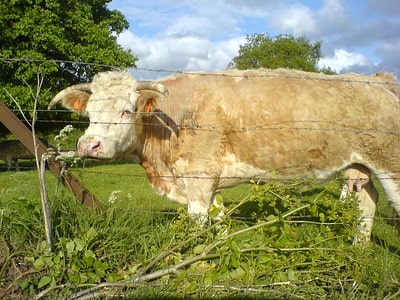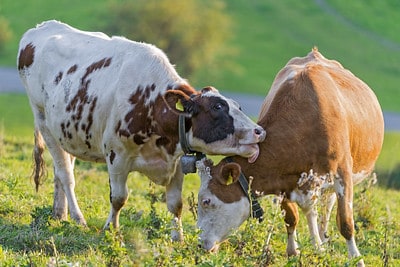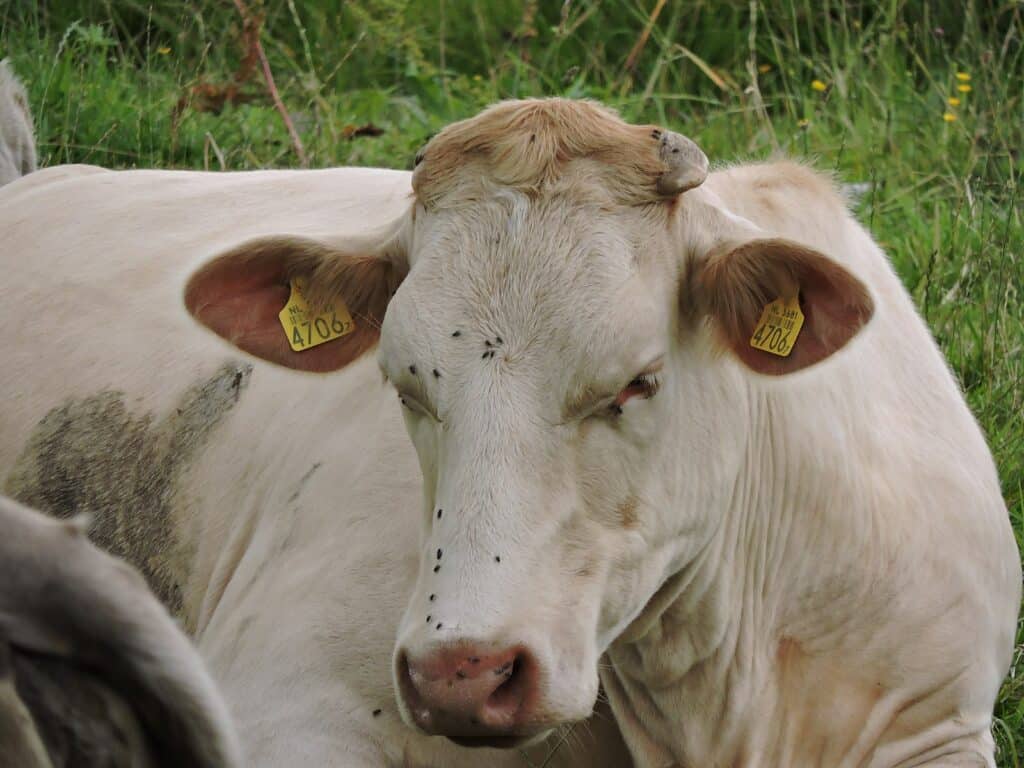Cows are beautiful creatures and are quite sensitive with high emotional intelligence. Let’s figure out whether they cry and, if yes, why.
Cows cry when they’re in distress or feel lonely. They go through complex emotions, much like humans, and experience sadness, fear, grief, and even joy. Usually, they shed tears and bellow when they’re sad and sprint around when happy. It is easy to observe a cow’s behaviour since they are expressive animals.
Key Takeaways:
| Topic | Key Points |
|---|---|
| Cows’ Emotional Expressions | – Cows experience complex emotions, including sadness, fear, grief, and joy, and express them through various behaviors. |
| – They shed tears, bellow, and sprint when they’re sad or happy, making their emotions quite visible. | |
| Cows Crying and Shedding Tears | – Cows do cry tears similar to humans when they’re distressed. They may also emit high-pitched moos that express their distress. |
| Reasons for Cows Crying | – Cows can cry due to sadness, loneliness, grief, ill-treatment, separation from their calves, pain, or hunger. |
| Cows Mourning and Loneliness | – Cows mourn when lonely or separated from loved ones and form strong bonds with each other in the herd. |
| – Separation triggers emotions of fear and loneliness in cows. | |
| Cows Feeling Sadness | – Cows do feel sadness, but they express it differently, including becoming quiet, distant, or frequently bellowing. |
| Cows Expressing Sadness | – Cows can express sadness through crying, including both shedding tears and bellowing loudly, often due to discomfort, pain, or separation. |
| Nighttime Crying by Cattle | – Cattle cry at night out of fear, signaling the presence of predators. They may also cry if they’re thirsty or in pain. |
| Cows Crying When Scared | – Cows cry, bellow, or become aggressive when scared, with mooing serving as an alert to the herd or barn owners. |
| Cows’ Reaction to Calves Taken | – Cows cry, chase their calves, or get aggressive when their calves are taken away, as it causes distress and loneliness. |
| Duration of Cows Crying for Calves | – Cows may audibly cry for their calves for 1 to 3 days, sometimes longer. They may continue to shed tears and show behavioral changes. |
| Cows Crying During Birth | – Cows cry while giving birth due to pain and distress. The calf is typically taken away for nurturing, forming a close bond later. |
| Why Cows Moo | – Cows moo for various reasons, including hunger, fear, seeking a mate, pain, discontentment, communication, stress, and more. |
| How Cows Express Happiness | – Happy cows may sprint, jump, have bright eyes, upright posture, and exhibit signs of friendliness. Their mooing becomes less frantic. |
| Cows’ Peaceful Nature | – Cows are known for their gentle and peace-loving nature. They form bonds, feel sorrow, and prefer to live in a harmonious environment. |
There’s a lot of debate about whether cows experience emotions and feel sad. Let’s take a look at some commonly asked questions in this regard.

Do cows cry tears?
Animals do not speak our language but express themselves in a different tongue. Let’s learn whether cows cry tears.
Cows shed tears, similar to humans. In addition to shedding tears, they also wail and let out high-pitched moos frequently. This ‘crying’ moo that the cows let out is very different from their other moos as it has a higher frequency and is quite frantic, thus expressing the animal’s distress.
Cows, like humans, are quite expressive. You have to carefully observe them and know about their behavioral patterns to understand their distress.
Why do cows cry?

There can be several reasons for cows crying. Let’s explore more in this regard.
Cows can cry out of sadness, loneliness, or grief. They’re social animals who prefer living in groups, so loneliness can be quite distressing for them. Besides, ill-treatment or separation from their calves may further trouble the cows who either cry tears or moo loudly. Cows also cry when they’re in pain or hungry.
It is essential to be sensitive to the needs of your cow and ensure they remain calm and happy throughout.
Do cows mourn?
Animals interact and express themselves in complex ways. Let’s find out whether cows mourn.
Cows mourn when they feel lonely or are separated from their young ones. They even mourn the deaths of their loved ones. There is a lot of scientific debate around cow’s behavior and how they react to separation and grief. However, it is generally agreed that they feel emotions of sorrow, loneliness, and despair.
Cows form a strong bond with one another, especially if they live in the same barn. So, separation can be quite distressing for them. It also triggers emotions of fear and loneliness.
Do cows feel sadness?

A common misconception is that cows do not feel the same emotions as humans, but that’s far from the truth. Let’s learn whether cows feel sadness.
Cows feel sadness, just like humans, but have a different way of expressing themselves. They do not always cry out of sadness but can become unusually quiet or distant. You also hear frequent bellowing. Cows can feel sad due to a variety of reasons – fear, grief, hunger, and loneliness being the chief among them.
To avoid feelings of sadness arising in cows, they should be reared in a congenial environment and not put in situations of distress, if possible.
Can cows cry from sadness?
Sadness can be expressed in varying ways. While some animals become quiet, others wail. Let’s see how cows express sadness.
Cows can cry out of sadness, either quietly or by bellowing. However, they can also express sorrow through aggression. There can be several reasons for their unhappiness, but it usually arises from discomfort, pain, loneliness, and separation.
Cows are often referred to as gentle giants because of their expressive nature. It is essential to understand their nature and treat them accordingly.
Why do cattle cry at night?
Anyone who lives near a barn has probably heard cattle crying at night quite often. Let’s understand the reasoning behind this.
Cattle cry at night out of fear. They’re scared of the silence and fear predators, inhuman or animal form. The mooing of cows at night might appear strange to most people, but it is a sign that danger is ahead. They can spot coyotes or wild dogs in the dark and start crying to alert the rest of the cows.
Cows also cry at night if they’re thirsty or in pain. Most farmers have learned how to interpret the nightly bellowings and can quickly spring to action if danger is near.
Do cows cry when scared?
Cows, like other animals, express fear in different ways. Let’s understand more about this aspect.
Cows cry when they’re scared, but some even bellow or become aggressive. Usually, cows shed tears when they’re sad or lonely, but in case of fear, they moo loudly in order to alert the herd or the barn owners. Calming a scaraed cow can be quite a task and can only be done by someone who is experienced in this regard.
Few cows also grunt or snort and lower their heads when they’re scared, but bellowing is the most common reaction.
Do cows cry when their calves are taken?
Cows, as we have established, feel emotions like humans. Let’s see how they react when their calves are taken away.
Cows cry for hours or days and bellow endlessly when their young ones are taken away. Some of them even chase the calves and get quite aggressive once separated. Sometimes, cows cry not because they’re missing their calves but due to their udders getting full, which causes tremendous discomfort.
Ultimately, cows are herd animals and feel lonely when separated from the herd. As such, the loss of their calves can cause tremendous mental anguish for the cow.
How long do cows cry for their babies?
A common question that is often raised is how long cows cry for their babies. Let’s explore more in this regard.
Usually, cows can audibly cry for their babies for around 1 to 3 days, while some others cry for hours. However, just because they stop bellowing doesn’t mean that they are not in distress anymore. They may continue to shed tears for their loss, and you might even notice a change in their behavioral patterns.
Many dairy farmers have stopped separating cows from their calves, seeing how poorly separation affects the cows.
Do cows cry when giving birth?
Giving birth is a painful experience – be it for humans or animals. Let’s understand whether cows cry while giving birth.
Cows cry when giving birth as they’re in pain and distress. While some cows bellow, others let out small, occasional grunts to express their distress. Even abrupt weaning can cause tremendous discomfort to the cow, who expresses their anguish through crying.
Once the child is born, the cow takes it away from the herd to nurture it and develop a close bond.
Why do cows moo?
A common perception is that cows moo when they’re sad or in distress. However, that is not the truth. Let’s learn more about this.
Cows moo due to the following reasons:
- Cows moo when they’re hungry and haven’t been fed in a while.
- Cows moo when they see danger and feel threatened.
- They moo when they seek a mate for breeding.
- Cows moo to express pain.
- They show their discontentment through mooing.
- Cows moo when they wish to communicate with each other.
- They moo when they’re put in a new environment and feel lonely.
- Cows moo when they are under stress.
Calming a cow is no rocket science. You need to be patient with it and make it feel comfortable, especially if it is in a new environment.
How do cows express happiness?
We have learnt a lot about how cows cry or express grief. Let’s learn something about how they express happiness.
Cows sprint around or jump into the air when they’re happy. In addition, you will notice bright eyes, upright posture, and display signs of friendliness. Cows will look very peaceful when they’re happy. Besides, their mooing becomes less high-pitched and more natural.
It is easy to tell when a cow is at peace since they do not display any signs of discomfort or aggression.
Conclusion
Cows are gentle creatures and prefer to live in peace. They are among the easiest animals to tame and are known for their quiet, peace-loving nature.
Cows experience feelings of sorrow which are no different than humans. They form similar bonds with their loved ones and can get quite distressed when separated from their herd. Mothers mourn for the loss of their calves and young ones.
All said and done, and it is essential to be sensitive to the needs of the animal you choose to domesticate. They should be adequately fed, treated gently, and allowed to move around and feel happy.




